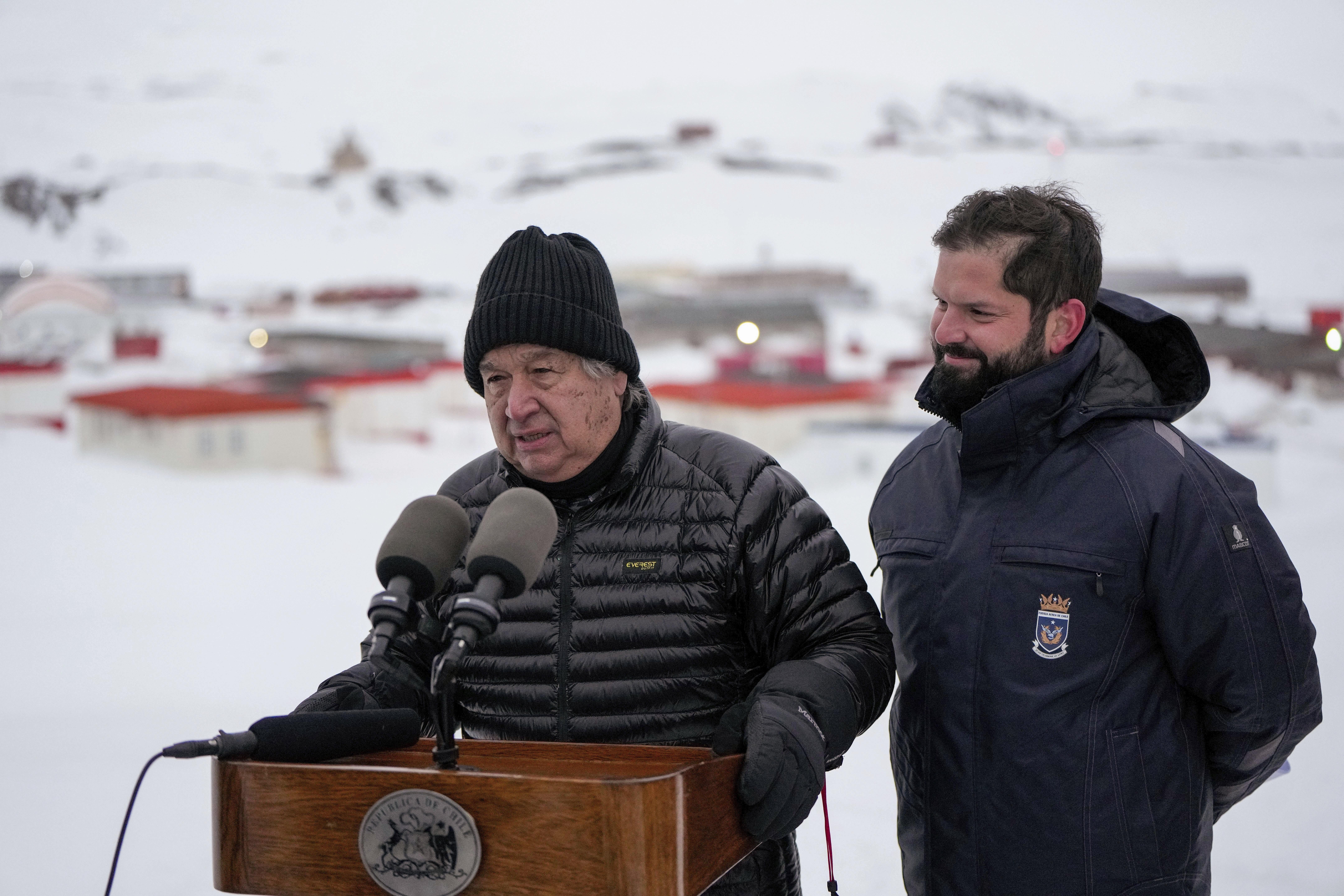 United Nations Secretary-General Antonio Guterres (left) talks to journalists, accompanied by Chile's President Gabriel Boric at Chile's Eduardo Frei Air Force Base on King George Island, Antarctica, Nov 24, 2023. Guterres' visit to Antarctica comes days before nations converge in Dubai for COP28 to address climate change. (PHOTO / AP)
United Nations Secretary-General Antonio Guterres (left) talks to journalists, accompanied by Chile's President Gabriel Boric at Chile's Eduardo Frei Air Force Base on King George Island, Antarctica, Nov 24, 2023. Guterres' visit to Antarctica comes days before nations converge in Dubai for COP28 to address climate change. (PHOTO / AP)
UNITED NATIONS - UN Secretary-General Antonio Guterres emphasized on Monday that world leaders attending the COP28 climate conference this week need to interrupt the perilous progression of global warming before a "critical tipping point" is encountered.
The UN chief was briefing reporters at the UN headquarters in New York after seeing for himself over the weekend the "profoundly shocking" speed at which ice is melting in Antarctica -- three times faster than the rate in the early 1990s.
READ MORE: US warming faster than global average, assessment shows
COP28, which refers to the 28th session of the Conference of the Parties to the United Nations Framework Convention on Climate Change, is scheduled to be held in Dubai, the United Arab Emirates, from Nov 30 to Dec 12.
He ( Antonio Guterres) pointed out that the consequences extend beyond the impact of floods and saltwater intrusion on food and water resources, affecting the sustainability of small islands and numerous coastal cities around the globe
Recent data shows that the current extent of sea ice at the South Pole is 1.5 million square kilometers less than the average for this season, an area equivalent to the total combined landmass of Portugal, Spain, France, and Germany.
"What happens in Antarctica doesn't stay in Antarctica," Guterres said. "We live in an interconnected world. Melting sea ice means rising seas. And that directly endangers lives and livelihoods in coastal communities across the globe."
He pointed out that the consequences extend beyond the impact of floods and saltwater intrusion on food and water resources, affecting the sustainability of small islands and numerous coastal cities around the globe.
READ MORE: UN report: Global emissions set to fall only 2% by 2030
"The movement of waters around Antarctica distributes heat, nutrients and carbon around the world, helping to regulate our climate and regional weather patterns," he told correspondents outside the UN Security Council.
"But that system is slowing as the southern Ocean grows warmer and less dense. Further slowdown -- or entire breakdown -- would spell catastrophe."
With no let-up in fossil fuel extraction "we're heading towards a calamitous three-degree Celsius temperature rise by the end of the century," he warned.
READ MORE: Nepal's mountains have lost one-third of their ice, UN chief says
"If we continue as we are, and I strongly hope we will not, the Greenland and West Antarctica ice sheets will cross a deadly tipping point," he said.
The vicious cycle means accelerated heating as ice diminishes and more extreme weather, said the secretary-general.
At COP28, "leaders must break this cycle," the UN chief declared.
"The solutions are well known. Leaders must act to limit global temperature rise to 1.5 degrees Celsius, protect people from climate chaos, and end the fossil fuel age."
Only a global pact to triple renewable energy use, a doubling in energy efficiency and access to clean power for all by 2030, will be sufficient, he said.


